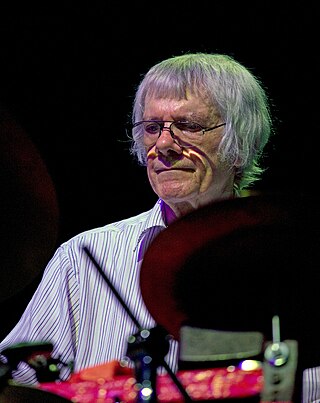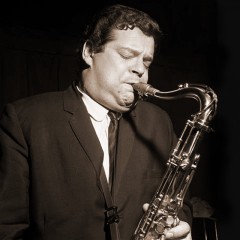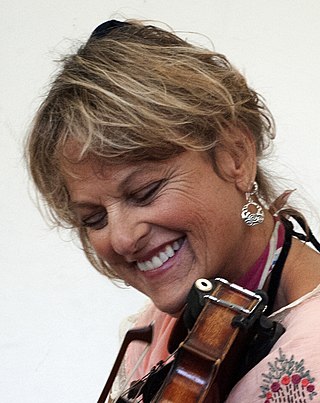Related Research Articles
Benjamin Burwell Johnston Jr. was an American contemporary music composer, known for his use of just intonation. He was called "one of the foremost composers of microtonal music" by Philip Bush and "one of the best non-famous composers this country has to offer" by John Rockwell.

Tony Oxley was an English free improvising drummer and electronic musician.

Donald Johnson Ellis was an American jazz trumpeter, drummer, composer, and bandleader. He is best known for his extensive musical experimentation, particularly in the area of time signatures. Later in his life he worked as a film composer, contributing a score to 1971's The French Connection and 1973's The Seven-Ups.
Frederick L. Hemke, DMA(néFred LeRoy Hemke Jr.; July 11, 1935 – April 17, 2019) was an American virtuoso classical saxophonist and influential professor of saxophone at Northwestern University. Hemke helped to increase the popularity of classical saxophone, particularly among leading American composers. He contributed to raise the recognition of the classical saxophone in solo, chamber, and major orchestral repertoire throughout the world. For half a century, from 1962 to 2012, Hemke was a full-time faculty music educator at Northwestern University's Bienen School of Music. In 2002, Hemke was named Associate Dean Emeritus of the School of Music. Hemke retired from Northwestern University in 2012. From the start of his career in the early 1960s, building on the achievements of earlier influential American teachers of classical saxophone — including those of Larry Teal, Joseph Allard, Cecil Leeson, Sigurd Raschèr, and Vincent Abato — Hemke helped build American saxophone repertoire through composers that included Muczynski, Creston, Stein, Heiden, and Karlins. Journalist and author Michael Segell, in his 2005 book, The Devil's Horn, called Hemke "The Dean of Saxophone Education in America." Hemke died on April 17, 2019.

Edward Brian "Tubby" Hayes was a British jazz multi-instrumentalist, best known for his virtuosic musicianship on tenor saxophone and for performing in jazz groups with fellow sax player Ronnie Scott and trumpeter Jimmy Deuchar. He is widely considered to be one of the finest jazz saxophonists to have emerged from Britain.
Joseph Horovitz was an Austrian-born British composer and conductor best known for his 1970 pop cantata Captain Noah and his Floating Zoo, which achieved widespread popularity in schools. Horovitz also composed music for television, including the theme music for the Thames Television series Rumpole of the Bailey, and was a prolific composer of ballet, orchestral, brass band, wind band and chamber music. He considered his fifth string quartet (1969) to be his best work.
Guillermo Perich is a Cuban violinist. He has worked with the Baltimore Symphony Orchestra, the Annapolis Symphony Orchestra, the Havana Philharmonic, the Mischakoff Quartet, the Walden Quartet, the Saint Louis String Quartet, and as a violist with the Baltimore String Quartet. He has also performed at the Chautauqua Music Festival and the Aspen Music Festival. He retired after 20 years of teaching at the University of Illinois school of music, Urbana, Illinois. In his career, he has traveled and taught in at least 25 of the 50 states as well as in Spain, Germany, Austria, and Switzerland.
Bernard Rands is a British-American contemporary classical composer. He studied music and English literature at the University of Wales, Bangor, and composition with Pierre Boulez and Bruno Maderna in Darmstadt, Germany, and with Luigi Dallapiccola and Luciano Berio in Milan, Italy. He held residencies at Princeton University, the University of Illinois, and the University of York before emigrating to the United States in 1975; he became a U.S. citizen in 1983. In 1984, Rands's Canti del Sole, premiered by Paul Sperry, Zubin Mehta, and the New York Philharmonic, won the Pulitzer Prize for Music. He has since taught at the University of California, San Diego, the Juilliard School, Yale University, and Boston University. From 1988 to 2005 he taught at Harvard University, where he is Walter Bigelow Rosen Professor of Music Emeritus.

Michael Mantler is an Austrian avant-garde jazz trumpeter and composer of contemporary music.

Ron Dewar was an American jazz saxophone and clarinet player who grew up in Plainfield, Illinois and worked in the Chicago area. His father, Robert Dewar, worked in a bowling alley. His mother, Ruth Jahneke Dewar taught music. His younger brothers Roger and Randy grew up to perform and teach music.
The Del Sol Quartet is a string quartet based in San Francisco, California that was founded in 1992 by violist Charlton Lee.

Kenneth Lee Ascher is an American jazz pianist, composer, and arranger who is active in jazz, rock, classical, and musical theater genres — in live venues, recording studios, and cinema production. With Paul Williams, he wrote the song "Rainbow Connection" for The Muppet Movie. Both Williams and Ascher received Oscar nominations for the 1979 Academy Awards for Best Original Song and Best Original Score. The song was also nominated for the Golden Globes for "Best Original Song" that same year.

June Christy was an American singer, known for her work in the cool jazz genre and for her silky smooth vocals. Her success as a singer began with The Stan Kenton Orchestra. She pursued a solo career from 1954 and is best known for her debut album Something Cool. After her death, she was hailed as "one of the finest and most neglected singers of her time."
Rob Dixon is an American jazz saxophonist.
Raymond Harry "Ray" Brown is an American composer, arranger, trumpet player, and jazz educator. He has performed as trumpet player and arranged music for Stan Kenton, Bill Watrous, Bill Berry, Frank Capp – Nat Pierce, and the Full Faith and Credit Big Band.
Victoria Ellen Bond is an American conductor and composer in New York City.

Hugo Kortschak was an Austrian-born American violinist and a member of the Chicago Symphony Orchestra from 1907 until 1914, founding member of the Berkshire String Quartet and Dean of Music at Yale University. His son was the plant physiologist Hugo P. Kortschak.

Sue Draheim was an American fiddler, boasting a more than forty year musical career in the US and the UK. Growing up in North Oakland, Draheim began her first private violin lessons at age eleven, having started public school violin instruction at age eight while attending North Oakland's Peralta Elementary School. She also attended Claremont Jr. High, and graduated from Oakland Technical High School in 1967.
The Walden String Quartet was a chamber music ensemble formed in 1934 by members of the Cleveland Orchestra. It was originally the idea of violinist Homer Schmitt and cellist Robert Swenson, who met in 1927. They recruited violinist Bernard Goodman and violist Leroy Collins for the original group. The viola chair changed many times until John Garvey joined in 1948.
James Donald Knapp, Jr. was an American jazz trumpeter, composer, and educator. He taught at Cornish College of the Arts in Seattle for 45 years.
References
- ↑ "John Garvey Memorial Celebration Held on Campus" (PDF). Sonorities: 4. Spring 2007. Retrieved 2016-10-01.
- ↑ "John Garvey Music and Papers, The Sousa Archives and Center for American Music". University of Illinois Archive Holdings Database. University of Illinois. Retrieved 2016-09-13.
- ↑ "Former music professor championed jazz studies at UI". The News-Gazette . Champaign, Illinois. August 3, 2006. Retrieved 2016-09-13.
- ↑ "Musical Talent Plentiful In Two Reading Families". Reading Eagle . Reading, Pennsylvania. December 23, 1936. pg 2, cols 6-8. Retrieved 2016-09-13.
- ↑ Huffman, Larry. "Principal Musicians of the Philadelphia Orchestra – Alfred Lorenz". The Stokowski Legacy (www.stokowski.org). Retrieved 2016-09-13.
- 1 2 3 "Beethoven, Haydn, Season Starters for Waldens". The Daily Illini . Champaign, Illinois. September 28, 1948. pg 5, col 4. Retrieved 2019-07-16.
- ↑ "David Garvey Presents Recital in Virginia". Reading Eagle . Reading, Pennsylvania. August 19, 1943. pg 3, col 2. Retrieved 2016-09-13.
- ↑ "ON THE STAND". The Billboard. 56 (28). p.17, col 2. July 8, 1944. Retrieved 2016-09-13.
- ↑ "Ridenour New Dean of Graduate School – Kuypers Named as Director of UI Music Department. By Board of Trustees". The Daily Illini . Champaign, Illinois. May 28, 1947. pg 1, cols 1-2. Retrieved 2019-07-20.
- ↑ "Walden String Quartet". Oxford Music Online. Oxford University Press. Retrieved 2016-09-13.
- ↑ Directory, Faculty and Students, 1948–1949. Urbana, Illinois: The University of Illinois Press. October 1948. p. 106. Retrieved 2016-09-13.
- ↑ Directory, Staff and Students, 1951–1952. Urbana, Illinois: The University of Illinois Press. 1974. p. 132. Retrieved 2016-09-13.
- ↑ "GARVEY HEADS COMMITTEE". The Daily Illini . Champaign, Illinois. May 27, 1952. pg 6, col 3. Retrieved 2016-09-30.
- 1 2 3 4 5 6 7 8 Harrison, Albert Dale (1986). A History of the University of Illinois School of Music, 1940–1970. Ed.D. Thesis, University of Illinois. pp. 281–285. ProQuest 303485936.
- ↑ Transactions of the Board of Trustees, July 1, 1958 to June 30, 1960 (PDF). University of Illinois Board of Trustees. 1960. p. 696.
- ↑ "The "Boo", or Bamboo". The Daily Illini . Champaign, IL. March 19, 1957. pg 1, col 2. Retrieved 2016-10-09.
- ↑ "U. OF I. TO GIVE JAZZ PLACE IN ARTS FESTIVAL". The Chicago Daily Tribune . Chicago, IL. February 22, 1959. pg 32, col 4. Retrieved 2016-09-30.
- ↑ "Union Board Agrees to Cosponsor Jazz Program with School of Music". The Daily Illini . Champaign, IL. October 19, 1960. pg 12, col 4-5. Retrieved 2016-09-30.
- ↑ "Collegiate Jazz Festival 1964 Program" (PDF). South Bend, IN. April 1964. pg 8. Retrieved 2016-09-30.
- ↑ "Collegiate Jazz Festival 1967 Program" (PDF). South Bend, IN. March 1967. pg 12. Retrieved 2016-09-30.
- ↑ "Collegiate Jazz Festival 1968 Program" (PDF). South Bend, IN. March 1968. pg 16. Retrieved 2016-09-30.
- ↑ "University Band Captures Ten Awards at Notre Dame Fest". The Daily Illini . Champaign, IL. March 19, 1969. pg 3 col 4. Retrieved 2016-09-30.
- ↑ Leonard Feather (July 13, 1968). "Jazz Fest Amateurs Top Pros". The Austin Statesman . Austin,TX. pg 18, col 1. Retrieved 2016-09-30.
- ↑ John S. Wilson (July 8, 1968). "It's Newcomers Day at Newport". The New York Times . New York, NY. pg 47, col 1. Retrieved 2016-09-30.
- 1 2 "Dixielandová skupina Big bandu University of Illinois USA - Praha 1968". YouTube. Retrieved 2017-06-04.
- ↑ "U. of I. Jazz Group to Tour Soviet Union". The Chicago Tribune . Chicago, IL. November 1, 1969. pg 6 col 3-4. Retrieved 2016-09-30.
- ↑ Thomas, Jo (September 22, 1998). "A Singer Is Returning to a Stage Where It All Began". The New York Times . Retrieved 2016-10-06.
- ↑ "Garvey, Inspired by Trip to Russia, Forms Balalaika Band". The Daily Illini . Champaign, IL. December 6, 1973. pg 18, col 1-3, p20 col 1-2. Retrieved 2016-10-01.
- ↑ "Garvey, John (1921–2006)". University of Illinois Archives. Retrieved 2016-10-01.
- ↑ "William Bergsma - Walden String Quartet Of The University Of Illinois* / Arthur Shepherd (2) - Marie Kraft, Walden String Quartet Of The University Of Illinois* - String Quartet #2 / Triptych For Soprano And String Quartet". Discogs . 1952.
- ↑ "Ernest Bloch / Johana Harris And The Walden String Quartet - Quintet For Piano And Strings". Discogs . 1955.
- ↑ "Harry Partch - The Bewitched". Discogs . 1958.
- ↑ "Andrew Imbrie, The California String Quartet, The Walden String Quartet - String Quartets 2 And 3". Discogs . 1958.
- ↑ Charles Ives & Alan Hovhaness (PDF). Folkways Records. 1966. FM 3369. Retrieved 2016-09-14.
- ↑ "Walter Piston / Alan Hovhaness - Earl Wild, The Walden String Quartet / William Masselos, Chamber Ensemble*, Izler Solomon - Quintet For Piano & Strings / Khaldis: Concerto For Piano, Four Trumpets & Percussion". Discogs . 1966.
- ↑ University of Illinois Jazz Band - T-Bird 1968-12-17. Internet Archive. 1968. Retrieved 2017-01-16.